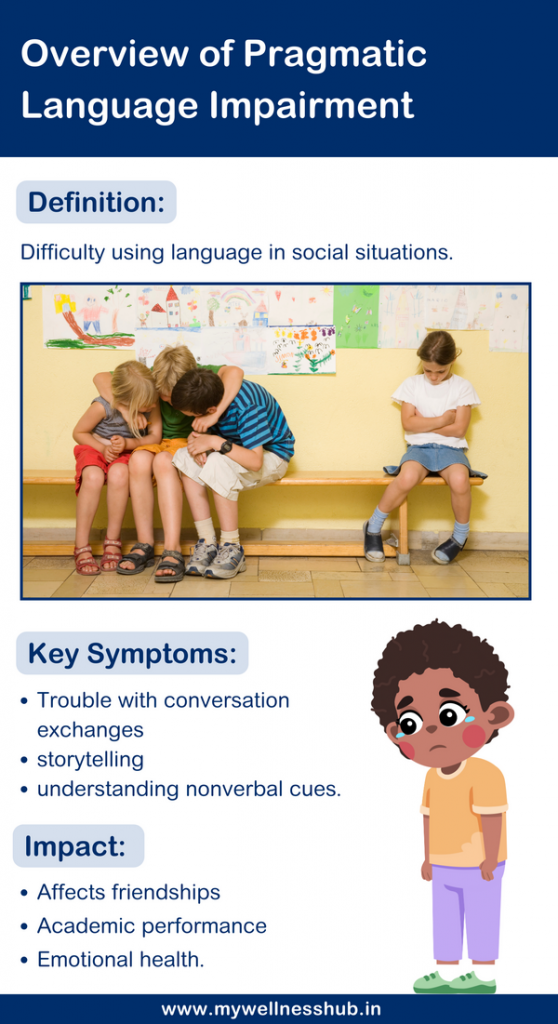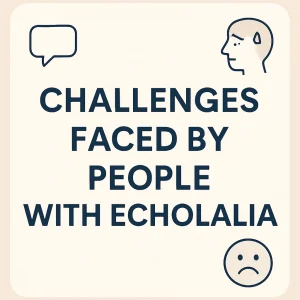Pragmatic Language Impairment: Key Facts You Need to Know
Last Updated: June 13, 2024
Have you ever wondered why some children or adults struggle with social interactions despite having no apparent language delay? This challenge could be due to a condition known as pragmatic language impairment. Understanding this condition is crucial as it affects how individuals use language in social situations, which is essential for making friends, succeeding in school, and thriving in the workplace.
Pragmatic language impairment refers to difficulties in the social use of verbal and nonverbal communication. This means that a person might know what to say but struggle with how and when to say it. They might have trouble maintaining conversations, understanding jokes or sarcasm, and using language appropriately in different social contexts. These difficulties can significantly impact social relationships, academic achievement, and career success.

What is Pragmatic Language Impairment?
Pragmatic language impairment (PLI), also known as social communication disorder, refers to difficulties in using language appropriately in social situations. This condition affects the ability to use verbal and nonverbal communication effectively, making it challenging for individuals to navigate everyday interactions.
People with pragmatic language impairment often struggle with:
- Understanding and using appropriate language in different social contexts.
- Interpreting nonverbal cues like facial expressions and body language.
- Taking turns in conversations.
- Maintaining topics in a discussion.
- Understanding figurative language, sarcasm, or jokes.
Pragmatic Language Impairment vs. Other Language Disorders
It’s important to distinguish PLI from other language disorders. Unlike expressive language disorder, which affects the ability to express oneself verbally, or receptive language disorder, which impacts the understanding of language, PLI specifically targets social aspects of communication.
- Pragmatic Communication Impairment: This term is often used interchangeably with PLI and highlights the struggle in practical use of language in social settings.
- Social Language Impairment: Another synonym for PLI, focusing on the difficulties in social aspects of communication rather than general language skills.
PLI vs. Other Language Disorders
| Aspect | Pragmatic Language Impairment (PLI) | Expressive Language Disorder | Receptive Language Disorder |
|---|---|---|---|
| Main Difficulty | Difficulty using language appropriately in social contexts | Difficulty expressing thoughts, ideas, and feelings verbally | Difficulty understanding spoken or written language |
| Symptoms | – Trouble with conversation exchanges – Difficulty telling coherent stories – Struggles with understanding and using nonverbal cues | – Problems formulating sentences – Limited vocabulary – Incomplete or incorrect sentences | – Anxiety due to the inability to understand |
| Impact on Social Interactions | – Strained friendships – Difficulty participating in group activities – Misinterpretation of social cues leading to isolation | – May lead to misunderstandings – Frustration when trying to communicate – Being perceived as less articulate | – Difficulty engaging in conversations – Social withdrawal due to confusion – Miscommunication with peers and adults |
| Impact on Emotional Health | – Frustration and anxiety in social situations – Lower self-esteem from repeated social failures | – Reduced confidence in verbal communication – Possible embarrassment from being misunderstood | – Anxiety due to the inability to understand Low self-esteem from repeated misunderstandings |
| Impact on Academic Performance | – Challenges in participating in class discussions – Trouble working on group projects | – Difficulty in oral presentations and writing tasks – Poor performance in language-heavy subjects | – Struggles with understanding lessons and instructions – Misunderstanding homework assignments and exam questions |
| Other Notable Differences | – May not affect basic language skills such as vocabulary or grammar – Often associated with conditions like autism spectrum disorder (ASD) | – Specifically affects the ability to generate spoken language – Can be associated with developmental delays | – Specifically affects the ability to interpret language – Can occur alongside other language or learning disorders |
Causes of Pragmatic Language Impairment
Pragmatic language impairment (PLI) can arise from a variety of factors, often intertwined, affecting an individual’s ability to use language in social contexts. Understanding these causes can help identify and manage the condition effectively.
Neurological Factors
Neurological factors play a significant role in the development of pragmatic language impairment. Conditions such as brain injuries or neurological disorders can impact the areas of the brain responsible for social communication. For instance, children with autism spectrum disorder (ASD) often exhibit symptoms of PLI. Autism can affect social interactions, making it challenging for individuals to use language appropriately in social settings.
Read more: What are the therapies offered to Autistic patients? | Therapies of Autism
Developmental Factors
Developmental delays can also contribute to pragmatic language impairment. Children with delayed language development or cognitive impairments may struggle with the social use of language. These developmental challenges can interfere with their ability to interpret nonverbal cues, understand the nuances of conversation, and use language effectively in various social situations.
Environmental Factors
Environmental factors, including limited exposure to social interactions or a lack of social modeling, can significantly influence pragmatic language skills. Children who do not have enough opportunities to engage in social activities or observe appropriate social behaviors may find it difficult to develop strong pragmatic skills.
How Conditions Like Autism Spectrum Disorder are Related
Autism spectrum disorder (ASD) is closely linked to pragmatic language impairment. Individuals with ASD often face challenges in social communication, including difficulty understanding and using language in social contexts. However, it’s important to note that while PLI is common in individuals with autism, not everyone with PLI has autism. The distinction lies in the presence of other autism-specific behaviors, such as repetitive actions and restricted interests, which are not typically seen in those with only PLI.
Symptoms of Pragmatic Language Impairment
Recognizing the symptoms of pragmatic language impairment is crucial for early identification and intervention. Here are some common signs to watch for:
Difficulty with Conversation Exchanges
Individuals with pragmatic language impairment often struggle with the basic flow of conversations. They might:
- Have trouble taking turns in conversations.
- Interrupt others frequently or fail to respond appropriately.
- Struggle with maintaining topics and may abruptly change the subject.
Challenges in Storytelling
Telling a coherent story can be difficult for those with PLI. They might:
- Provide disorganized or incomplete narratives.
- Leave out important details or include irrelevant information.
- Have difficulty following the logical sequence of events.
Understanding Nonverbal Cues
Interpreting nonverbal signals such as body language, facial expressions, and gestures can be particularly challenging. This might manifest as:
- Misinterpreting or not noticing social cues.
- Difficulty understanding the emotions or intentions of others.
- Lack of appropriate eye contact during interactions.
Limited Ability to Initiate and Maintain Conversations
People with PLI may find it hard to start conversations or keep them going. They might:
- Use repetitive or scripted language.
- Avoid social interactions or seem withdrawn.
- Have difficulty with indirect requests and implied meanings.
Misinterpretation of Figurative Language
Understanding nonliteral language, such as idioms, sarcasm, and jokes, is often a challenge. They might:
- Take figurative expressions literally.
- Struggle with understanding humor or irony.
- Misinterpret metaphors and similes.
Impact on Social Interactions and Relationships
These symptoms can significantly affect social interactions and relationships. Individuals with pragmatic language impairment may:
- Find it difficult to make and keep friends.
- Experience social isolation and loneliness.
- Face challenges in academic settings due to difficulties in participating in group activities and discussions.
- Feel frustrated or anxious in social situations.
Symptoms and Their Impacts
| Symptom | Impact on Social Interactions | Impact on Emotional Health |
|---|---|---|
| Difficulty with conversation exchanges | Misunderstandings, social isolation | Frustration, anxiety |
| Challenges in storytelling | Disorganized communication, lack of coherence | Low self-esteem, confusion |
| Understanding nonverbal cues | Misinterpreting social cues | Feeling misunderstood |
| Limited ability to initiate and maintain conversations | Difficulty forming friendships | Social withdrawal |
| Misinterpretation of figurative language | Confusion in social settings | Embarrassment, reduced confidence |
Impact on Social and Emotional Well-being
Pragmatic language impairment (PLI) can profoundly affect an individual’s social and emotional well-being, impacting friendships, academic performance, and overall emotional health. Let’s delve into how these areas are influenced and provide some real-life examples to illustrate these impacts.
Friendships
Building and maintaining friendships can be challenging for individuals with PLI. Social interactions often rely heavily on the ability to understand and use language appropriately. For instance, a child with PLI might:
- Struggle to join in on group conversations during recess, leading to feelings of exclusion.
- Misinterpret social cues, such as body language or facial expressions, causing misunderstandings with peers.
- Have difficulty taking turns in conversation or staying on topic, which can frustrate others and make forming connections harder.
Example: Imagine a scenario where a child, Alex, frequently interrupts his friends during playtime because he doesn’t understand the flow of conversation. His friends might start to avoid playing with him, leaving Alex feeling isolated and lonely.
Academic Performance
PLI can also impact academic performance. Classroom interactions often require effective communication, whether it’s participating in group projects, understanding teacher instructions, or contributing to class discussions. Children with PLI may:
- Find it hard to ask for help or clarification, leading to misunderstandings and mistakes in their work.
- Struggle with storytelling or writing assignments that require a clear narrative structure.
- Have difficulty following complex instructions, impacting their ability to complete tasks accurately.
Example: Consider a student named Mia, who struggles to follow multi-step instructions from her teacher. During a science project, Mia might miss crucial steps, resulting in lower grades and a lack of confidence in her academic abilities.
Emotional Health
The social challenges associated with PLI can take a toll on emotional health. Persistent difficulties in communication can lead to feelings of frustration, anxiety, and low self-esteem. Individuals with PLI may:
- Experience social anxiety due to fear of making mistakes in social interactions.
- Feel frustration from not being understood or from misunderstanding others.
- Develop low self-esteem as a result of repeated social failures or rejections.
Example: An adolescent named Sam might avoid social gatherings altogether because of past experiences where his attempts to join conversations were awkward or misunderstood. This avoidance can lead to increased isolation and depression.
Treatment Approaches for Pragmatic Language Impairment
Addressing pragmatic language impairment effectively requires a combination of targeted therapies and supportive strategies. Here, we’ll explore the most effective treatment methods, focusing on the crucial role of speech-language pathologists (SLPs) and practical examples of therapy activities.
Speech-Language Therapy
Speech-language therapy is the cornerstone of treatment for pragmatic language impairment. SLPs specialize in assessing and treating communication disorders, and their expertise is invaluable in helping individuals improve their social communication skills.
- Role of Speech-Language Pathologists (SLPs) SLPs play a multifaceted role in treating PLI. They conduct comprehensive assessments to identify the specific areas of difficulty and develop individualized treatment plans. These plans often include:
- Targeted Exercises: These are designed to address specific social communication challenges. For example, an SLP might work on improving turn-taking in conversations or understanding nonverbal cues.
- Role-Playing: This involves practicing social scenarios in a controlled environment. Role-playing helps individuals learn how to navigate different social situations, such as greeting someone, asking for help, or joining a group conversation.
- Structured Play Dates: SLPs may organize play dates with peers to provide real-life practice opportunities. These sessions are structured to ensure that the individual can apply the skills they are learning in a supportive setting.
Social Skills Training
In addition to speech-language therapy, social skills training can be highly beneficial. This type of training focuses on teaching explicit social rules and expectations, providing opportunities for practice and generalization, and encouraging self-awareness and self-advocacy.
Examples of Social Skills Training Activities:
- Conversation Clubs: These clubs offer a safe space for individuals to practice conversational skills with peers under the guidance of an SLP or trained facilitator.
- Social Stories: These are short narratives that describe specific social situations and appropriate responses. Social stories help individuals understand what to expect and how to behave in various scenarios.
- Group Activities: Participating in group activities, such as games or collaborative projects, allows individuals to practice turn-taking, teamwork, and communication in a natural setting.
Parent and Caregiver Involvement
Involving parents and caregivers in the treatment process is essential for reinforcing skills outside of therapy sessions. SLPs often provide training and resources to help parents support their child’s progress at home. This might include:
- Creating Structured Environments: Establishing clear routines and expectations at home to help the child feel more comfortable and confident in social situations.
- Modeling Social Behaviors: Demonstrating appropriate social interactions and encouraging the child to observe and mimic these behaviors.
- Providing Positive Reinforcement: Using praise and rewards to reinforce successful social interactions and encourage continued practice.
Strategies for Supporting Individuals with Pragmatic Language Impairment
Supporting individuals with pragmatic language impairment (PLI) involves practical strategies that can be implemented by parents, teachers, and caregivers. Here are some effective approaches to help improve social communication skills:
Creating Structured Environments
A structured environment can provide a sense of predictability and security, which is beneficial for individuals with PLI. Here are some tips:
- Establish Clear Routines: Daily routines can help individuals understand what to expect and reduce anxiety. For example, setting specific times for activities like homework, play, and meals can create a stable framework.
- Use Visual Schedules: Visual aids such as charts or calendars can help individuals follow routines and transitions between activities more smoothly.
- Create Predictable Social Scenarios: Prepare individuals for social interactions by discussing what will happen in advance. For example, before a family gathering, explain who will be there and what kind of conversations might occur.
Teaching Explicit Social Rules
Teaching social rules explicitly can help individuals with PLI understand appropriate behavior in various contexts.
- Break Down Social Interactions: Explain social interactions step-by-step. For instance, describe how to greet someone, make small talk, and take turns in conversation.
- Role-Playing: Practice social scenarios through role-playing. This can include common situations such as ordering food at a restaurant, asking for help, or joining a group activity.
- Social Stories: Use social stories to illustrate specific social situations and appropriate responses. These narratives can help individuals visualize and understand how to behave in different contexts.
Providing Practice Opportunities
Regular practice is essential for mastering social communication skills.
- Organize Play Dates: Arrange structured play dates with peers to provide opportunities for practicing social interactions in a supportive setting.
- Encourage Participation in Group Activities: Engage individuals in group activities such as sports, clubs, or hobby groups where they can practice interacting with others.
- Facilitate Conversation Clubs: Create conversation clubs where individuals can practice talking with peers in a structured and supportive environment.
Encouraging Self-Awareness and Self-Advocacy
Helping individuals develop self-awareness and self-advocacy skills is crucial for their long-term success.
- Self-Reflection: Encourage individuals to reflect on their social interactions. Discuss what went well and what could be improved.
- Teach Self-Advocacy: Help individuals understand their strengths and challenges and how to communicate their needs to others. For example, teach them to say, “I didn’t understand that; can you explain it differently?”
- Positive Reinforcement: Use positive reinforcement to celebrate successes and motivate continued effort. Praise specific behaviors, such as using a new social skill correctly or making an effort to interact.
Conclusion
Pragmatic language impairment (PLI) affects how people use language in social settings. We discussed its definition, causes, symptoms, and how it impacts social and emotional well-being. Recognizing the signs early and understanding the condition can lead to better support and interventions, helping individuals improve their social communication skills and overall quality of life.
Effective treatments like speech-language therapy and social skills training are crucial. Speech-language pathologists (SLPs) help by providing targeted exercises, role-playing, and structured activities. If you think someone might have PLI, it’s important to seek professional help. At Wellness Hub, we offer resources and support to assist individuals and their families.
Frequently Asked Questions:
1. What is pragmatic language impairment?
Pragmatic language impairment (PLI) is a condition that affects the social use of verbal and nonverbal communication. People with PLI have trouble using language appropriately in social situations, which can impact their ability to interact effectively with others.
2. What are the common symptoms of pragmatic language impairment?
Common symptoms include difficulty with conversation exchanges, storytelling, understanding nonverbal cues, maintaining topics, and interpreting figurative language like jokes or sarcasm.
3. How is pragmatic language impairment different from other language disorders?
PLI specifically impacts social communication skills, unlike other language disorders that might affect the ability to express oneself verbally (expressive language disorder) or understand language (receptive language disorder).
4. What causes pragmatic language impairment?
PLI can be caused by a variety of factors, including neurological issues, developmental delays, and environmental factors. It is often associated with conditions like autism spectrum disorder.
5. How does pragmatic language impairment affect social interactions and relationships?
Individuals with PLI may struggle to make and keep friends, participate in group activities, and understand social cues, which can lead to social isolation, frustration, and anxiety.
6. What are the effective treatments for pragmatic language impairment?
Effective treatments include speech-language therapy and social skills training. Speech-language pathologists (SLPs) play a crucial role in diagnosing and treating PLI through targeted exercises, role-playing, and structured activities.
7. Can pragmatic language impairment be treated at home?
While professional help is essential, parents and caregivers can support treatment by creating structured environments, teaching explicit social rules, providing practice opportunities, and encouraging self-awareness and self-advocacy.
8. When should I seek professional help for pragmatic language impairment?
If you notice signs of PLI, such as difficulty with social interactions or understanding social cues, it’s important to seek help from a speech-language pathologist for a proper diagnosis and treatment plan.
9. How can Wellness Hub help with pragmatic language impairment?
At Wellness Hub, we offer a range of resources and support services to assist individuals with PLI and their families. Visit our therapy resources page for more information.
10. What are some strategies for supporting someone with pragmatic language impairment?
Strategies include creating structured environments, teaching social rules explicitly, providing practice opportunities through play dates or conversation clubs, and encouraging self-awareness and self-advocacy.
About the Author:
Anuradha Karanam
Speech-language pathologist (7+ years of experience)
Anuradha Karanam is a skilled speech-language pathologist with over 6 years of experience. Fluent in Tamil, Telugu, Hindi, and English, she specializes in parent counseling, speech sound disorders, fluency assessment, and speech-language evaluations. Anuradha excels at working with children with developmental disorders, offering creative and effective therapy programs. Currently, at Wellness Hub, she holds a BASLP degree and is registered with the RCI (CRR No A85500). Her patience, ambition, and dedication make her a trusted expert.
Connect with Anuradha to learn more about how she can help you or your loved one find their voice.
Book your Free Consultation Today
Parent/Caregiver Info:
Client’s Details:
* Error Message









